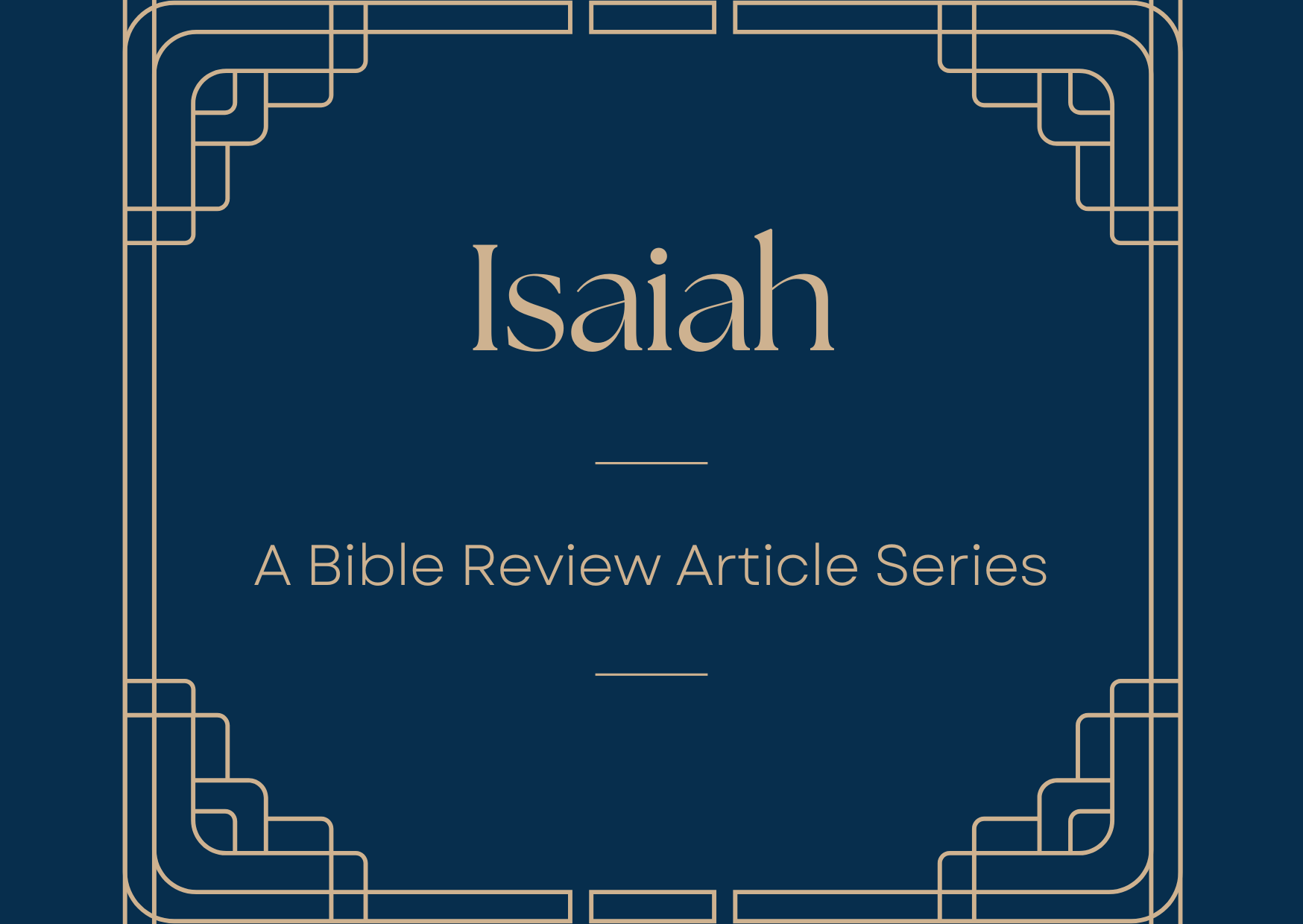
Isaiah:
A Quick Overview
by Milo





Follow us on social media for
FREEBIES and New Article releases.
OR
Sign Up for Our Freebie Email List and Have Freebies Delivered Directly To Your Inbox
Introduction
The Book of Isaiah is a prophetic text that speaks of judgment and restoration, highlighting God's sovereignty and the promise of the coming Messiah.
Authorship and Date
Isaiah, the son of Amoz, is traditionally credited with writing this book. It spans a period from approximately 740-681 BC during the reigns of Uzziah, Jotham, Ahaz, and Hezekiah.
Purpose and Themes
Isaiah’s purpose is to call Israel back to faithfulness and foretell both judgment and redemption. Key themes include:
- God’s Holiness: Emphasizing God's absolute moral purity.
- Judgment and Restoration: Warnings of exile and promises of renewal.
- The Messiah: Prophecies about the coming Savior.
- The Sovereignty of God: God's control over nations and history.
Key Verses
- Isaiah 6:8 - "Then I heard the voice of the Lord saying, 'Whom shall I send? And who will go for us?' And I said, 'Here am I. Send me!'"
- Isaiah 7:14 - "Therefore the Lord himself will give you a sign: The virgin will conceive and give birth to a son, and will call him Immanuel."
- Isaiah 9:6 - "For to us a child is born, to us a son is given, and the government will be on his shoulders."
- Isaiah 40:31 - "But those who hope in the Lord will renew their strength."
- Isaiah 53:5 - "But he was pierced for our transgressions, he was crushed for our iniquities."
Summary of Content
Isaiah contains prophecies of judgment against Israel and surrounding nations, as well as messages of hope about the coming Messiah and God's ultimate redemption plan.
Structure of Isaiah
Chapters 1-39: Judgment and Warnings
- Rebukes Israel for sin and foretells exile.
Chapters 40-55: Comfort and Redemption
- Proclaims hope and restoration for Israel.
Chapters 56-66: Future Glory
- Discusses God’s eternal kingdom and justice.
Application and Relevance
The Book of Isaiah is one of the most significant prophetic books in the Bible, offering **warnings, hope, and the promise of the coming Messiah**. It speaks about judgment for sin but also about God's grace and ultimate redemption.
Isaiah teaches us the importance of **trusting God rather than relying on human strength** (Isaiah 40:31). It reminds us that **God’s plans are sovereign** and that true salvation comes through His righteousness, not our own efforts. The book also contains powerful prophecies about Jesus Christ, demonstrating how God’s plan unfolds across history.
Connections to Other Books
Isaiah is heavily referenced in the **New Testament**, especially in the Gospels, as Jesus fulfills many of its prophecies. Key connections include:
- **Isaiah 7:14** prophesies the virgin birth of Christ, fulfilled in Matthew 1:22-23.
- **Isaiah 53** describes the suffering servant, which parallels Jesus' crucifixion in the Gospels.
- **Isaiah 40:3** is quoted in reference to John the Baptist preparing the way for Jesus (Matthew 3:3).
Isaiah also aligns with other prophetic books like **Jeremiah and Ezekiel**, which continue themes of God's judgment and restoration. The book’s message of hope connects with **Revelation**, where God's final redemption plan is fully revealed.
Study Questions
- 1. What was Isaiah’s calling in Isaiah 6, and how did he respond?
- 2. How do Isaiah’s prophecies about Jesus strengthen our faith?
- 3. What does Isaiah teach about God’s justice and mercy?
- 4. Why was Judah warned against forming alliances with foreign nations?
- 5. What is the significance of Isaiah 53 in Christian theology?
- 6. How does Isaiah describe the future kingdom of God?
- 7. What lessons can we learn from Hezekiah’s faith and failures in Isaiah?
- 8. How does Isaiah’s message apply to modern society and personal faith?
- 9. What role does Isaiah play in shaping the message of the New Testament?
- 10. How does Isaiah 40 encourage believers to trust in God's timing?
Frequently Asked Questions
- 1. Who wrote the Book of Isaiah?
Isaiah, the prophet, wrote most of the book, though some scholars believe later sections were added by his disciples.
- 2. What is the main theme of Isaiah?
The main theme is **judgment and redemption**, showing both God’s justice and His mercy.
- 3. What are the Messianic prophecies in Isaiah?
Isaiah contains many prophecies about Jesus, including His birth (Isaiah 7:14), ministry (Isaiah 61:1-2), and sacrifice (Isaiah 53).
- 4. Why does Isaiah emphasize trusting in God?
Isaiah warns against trusting in human power (Assyria, Egypt) and calls people to rely fully on God.
- 5. How does Isaiah describe God’s sovereignty?
Isaiah 46:9-10 declares that God alone knows the future and controls history.
- 6. What does Isaiah 40:31 mean?
It encourages believers to find strength in waiting on the Lord rather than relying on their own abilities.
- 7. How does Isaiah point to Jesus?
Isaiah 53 gives a detailed prophecy of Christ’s suffering and atonement for sin.
- 8. What is the significance of Isaiah’s vision in chapter 6?
Isaiah sees God’s holiness and responds with humility, emphasizing the need for repentance.
- 9. What does Isaiah say about the new heavens and new earth?
Isaiah 65:17-25 describes God’s future restoration of all things, echoed in Revelation 21.
- 10. Why is Isaiah often called the “fifth Gospel”?
Because it contains so many direct prophecies about Christ and His mission of salvation.
Daily Reading Plan
| Day |
Reading |
| Day 1 | Isaiah 1 |
| Day 2 | Isaiah 2-5 |
| Day 3 | Isaiah 6-9 |
| Day 4 | Isaiah 10-13 |
| Day 5 | Isaiah 14-18 |
| Day 6 | Isaiah 19-23 |
| Day 7 | Isaiah 24-27 |
| Day 8 | Isaiah 28-30 |
| Day 9 | Isaiah 31-34 |
| Day 10 | Isaiah 35-37 |
| Day 11 | Isaiah 38-41 |
| Day 12 | Isaiah 42-44 |
| Day 13 | Isaiah 45-48 |
| Day 14 | Isaiah 49-51 |
| Day 15 | Isaiah 52-56 |
| Day 16 | Isaiah 57-60 |
| Day 17 | Isaiah 61-64 |
| Day 18 | Isaiah 65-66 |

More Bible Overviews
Genesis Overview
Exodus Overview
Proverbs Overview
Ecclesiastes Overview
Isaiah Overview
Daniel Overview
Matthew Overview
Gospel of John Overview
Acts Overview
Romans Overview
1 Corinthians Overview
Revelation Overview
Freebie Offers
Sign Up for Our Freebie Email List and Have Freebies Delivered Directly To Your Inbox
Recommended Reading
Feeding Your Spiritual Growth: Best Online Bible Study Platforms
Strengthen Your Spirit: Impactful Bible Study Topics for Believers
Find Your Voice: Expressive Church Journal Prompts for Christians
Journey to Enlightenment: Best Bible Study Tools for Growth
From Busyness to Fruitfulness: A Biblical Approach to Time Management (Part 1)
From Busyness to Fruitfulness: Biblical Strategies for Effective Time Use (Part 2)
SOAP Bible Study and Other Study Methods: Which One is Right for You?
How to Use the SOAP Bible Study Method for a Deeper Walk of Faith
How to Study the Psalms Using the SOAP Method
Applying Biblical Wisdom to Financial Decision-Making
Visit Us on Pinterest









